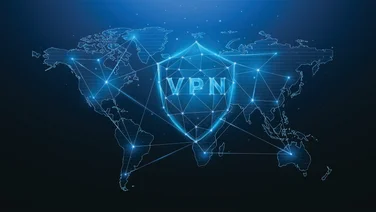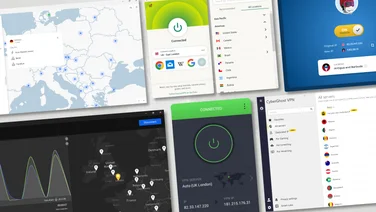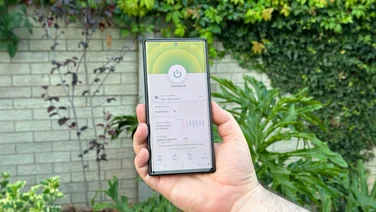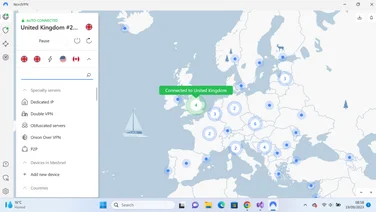To help us provide you with free impartial advice, we may earn a commission if you buy through links on our site. Learn more
- How to choose the best VPN for Mac
- Will using a VPN slow down my internet connection?
- Are services with more Mac VPN servers always better?
- Can I trust my Mac VPN provider?
- Best VPNs for Mac 2019
- 1. ExpressVPN: The best all-round VPN for Mac
- ExpressVPN - Save 49% on the one-year plan
- 2. CyberGhost: Most user-friendly Mac VPN
- CyberGhost VPN - Save 80% on the 3-year plan
- 3. NordVPN: Best Mac VPN for maximum security
- NordVPN - Save 75% on the 3-year plan
- 4. Surfshark VPN: Best value VPN for Mac
- 5. TunnelBear: Best Mac VPN for lightweight use

Using a VPN service is like having your own private internet. When you’re connected, all your browsing traffic is securely encrypted, so no one can track your online activity – not even your ISP.
A VPN – short for ‘virtual private network’ – will ensure that all your online activity stays anonymous. Whoever tries to monitor your internet connection will only see an encrypted connection to your VPN service provider. Apart from being a great way to browse safely on public Wi-Fi networks, you can also use a VPN to access websites that your ISP or government has blocked.
This works with geo-blocked content, too. For example, if your favourite streaming websites aren’t available in the UK, you can access them via a VPN server in the US. The same rule applies if you’re travelling abroad and want to access BBC iPlayer, which is only available when you connect using a UK server through a good VPN service.
In short, there are several good reasons to pay the modest subscription fee for a good VPN service.
READ NEXT: Best VPN services 2020
How to choose the best VPN for Mac
The first thing to know is that VPN services themselves aren’t tied to any particular platform. Almost all providers support both macOS and Windows, and most offer apps for your smartphone and tablet as well. This is a good thing because it means that one subscription can cover multiple devices at the same time.

Unfortunately, though, these different operating systems aren’t always treated equally. Some VPNs come with feature-rich, user-friendly clients for the Mac, while others seem to focus more on their Windows software, and treat macOS as an afterthought. Whatever your platform of choice, it makes sense to choose a VPN that works well on it.
READ NEXT: Best Android VPN apps
Will using a VPN slow down my internet connection?
The short answer is yes, because this is an inevitable consequence of your traffic taking an indirect route via your chosen VPN server, instead of directly through your ISP. In most cases, though, you won’t even notice this speed dip, especially if your download speeds exceed 50MBPS, which is the average UK download speed. In this case, the connection should still be fast enough for comfortable web browsing and even streaming video content, like live sports games.
The best way to minimise your browsing speed reduction while using a VPN is to choose a server that’s not too far away from your current geographical location. For example, if you’re based in the UK, then surfing via the Netherlands won’t reduce your regular browsing speed by much. However, if you try connecting to servers located in Australia and India, then you will inevitably notice the difference in speed.
READ NEXT: How to watch UK TV abroad
Are services with more Mac VPN servers always better?
In general, VPN services with a good number of servers indicate plenty of load capacity, so you can expect a smooth, lag-free connection even if thousands of other people are using the service at the same time as you. But don’t go by numbers alone.
For example, if you’re a regular traveller you might want a VPN service whose servers are spread out across a large number of countries. On the other hand, if your primary aim is to access US-streaming services like US Netflix, HBO and Hulu, then you’re better off choosing a service with a high proportion of US-based servers, even if that particular VPN service doesn’t have as many servers in other countries.
Can I trust my Mac VPN provider?
As long as you choose a reputable one, yes. Most VPNs use 256-bit encryption which is effectively unbreakable, along with a host of other security technologies. Here’s an in-depth explanation from one of our top-recommended VPN providers, ExpressVPN.
Another useful feature to look out for is a “killswitch” option in the software. This automatically suspends all internet activity if the VPN connection is lost for any reason. Without this, a network glitch could theoretically cause your computer to suddenly switch back to your unencrypted ISP connection, thereby exposing your online activity.

For extra peace of mind, choose a VPN service based outside Australia, Canada, New Zealand, the UK and US. These five countries are commonly known as the ‘Five Eyes’ because they have an intelligence-sharing agreement between them, which extends to online surveillance. Other countries don’t have as stringent rules, meaning the local authorities won’t be able to monitor what you’re doing, or legally compel the VPN service to hand over your data.
Regardless of which country your VPN service is based in, you should always choose one with a strict no-logs policy, meaning that it doesn’t store any information in the first place. This is the only failsafe way to protect your online safety regardless of where your VPN service is based.
How much should I pay, and how many devices can I protect?
While there are a few free VPNs out there, but we suggest you steer clear of these because you need to ask yourself how these services sustain themselves. The sad truth is that some of them are funded by monetising your online activity, which runs rather counter to the purpose of a VPN.
Thankfully, subscribing to a good VPN service doesn’t cost a fortune anymore. Short-term subscriptions can be pricey, often topping £10 per month, but if you’re willing to make a year-long commitment you can pay less than half of that. The longer subscription plan you take, the cheaper your VPN will cost.
You’ll find that there’s often little price difference between a three-year VPN subscription plan and a two-year one. And there’s no harm signing up for a long-term plan because all good VPN services offer a 30-day money-back guarantee, so you can always back out within the first few weeks if you’re not satisfied, or switch to a better provider.
READ NEXT: Best free VPN services
Best VPNs for Mac 2019
1. ExpressVPN: The best all-round VPN for Mac
Read our verdict: ExpressVPN review

ExpressVPN’s Mac client opens with the simplest interface imaginable. A “smart location” is pre-selected, based on your present location, to give you the fastest speed over a secure connection. Above this, you’ll see a big “Click to connect” icon, which fires up the VPN right away. What could be easier?
For more control, click on the “…” icon next to the Smart Location. This opens a separate pane letting you choose from more than 3,000 servers generously spread across more than 90 countries. The failsafe killswitch is always on by default, and the Split Tunnelling feature lets you specify which apps should always (or never) use the VPN. A handy browser extension for Chrome and Firefox lets you easily turn the VPN on and off while browsing.
Performance is great too. The built-in Speed Test tool takes a good few minutes to complete, but it means you don’t have to muck around trying out lots of different servers to find the best ping times and download speeds. We got more than 60MBPS downstream via the New York server, and had no problem accessing every US site we wanted, including US Netflix, which obviously has the biggest library of movies and TV shows anywhere in the world. The service also lets you access BBC iPlayer, which not many VPNs do.
ExpressVPN Key specs
Servers:3,000+ in 94 countries
Simultaneous connections: 5
Money-back guarantee: 30 days
Headquarters: British Virgin Islands
ExpressVPN – Save 49% on the one-year plan
2. CyberGhost: Most user-friendly Mac VPN
Read our verdict: CyberGhost VPN review

The CyberGhost Mac client installs as a discreet ghostly icon in your menu bar, which turns yellow when you’re connected. You can click it to access a simple on/off switch, and choose between a few preselected locations and services (including US Netflix). Click the little yellow arrow however and a much fuller interface springs out, with a floating list of countries.
You can double-click to connect instantly, or view a breakdown of all the servers in a particular country, each of which is named after the city it’s located in. It’s a clear and easy way to get connected, and for each country and server there’s a readout of distance and server load, giving you a clear idea of which ones are likely to be the most responsive. We picked a server in San Francisco showing 30% load and got an exceptional 105MBPS download speed – effectively maxing out our local broadband connection.
You’ll look in vain for a killswitch option, but that’s only because it’s permanently enabled, which is brilliant. There are also options to block ads, malicious websites and tracking technologies, and “Smart rules” that automatically enable the VPN when you connect to a known or unknown Wi-Fi network. There’s no way to route only certain apps over the VPN, however – which is annoying, since the Windows software can do that.
It’s a good option for those seeking a fuss-free VPN, and the company even publishes an annual transparency report, providing a little extra reassurance that your data is in safe hands.
CyberGhost VPN Key specs
Servers:4,884 in 59 countries
Simultaneous connections: 7
Money-back guarantee: 45 days
Headquarters: Romania
CyberGhost VPN – Save 80% on the 3-year plan
3. NordVPN: Best Mac VPN for maximum security
Read our verdict: NordVPN review

A VPN is supposed to be secure, but NordVPN goes further than most. The standard client (available on the Mac App Store) includes support for Double VPN and Onion Over VPN. If you download the enhanced OpenVPN client from the NordVPN website, you also get malware protection, plus bespoke obfuscated server options designed to get around infrastructure obstacles such as the “Great Firewall of China”.
Like ExpressVPN, the service has been independently audited to certify that no identifiable information is logged and, because it’s based in Panama, it’s beyond the reach of state surveillance agencies.
The Mac software is pretty straightforward to use, with a list of available countries appearing in the left-hand pane. A fly-out window lets you optionally specify an individual city or server although, frustratingly, there’s no way to compare the speeds of different exit nodes short of trial and error. While you can mark individual servers as your favourites, you can’t do the same with regions. Performance is generally decent though: we got 52MBPS downstream from New York.
NordVPN Key specs Servers: 5,728 in 60 countries
Simultaneous connections: 6
Money-back guarantee: 30 days
Headquarters: Panama
NordVPN – Save 75% on the 3-year plan
4. Surfshark VPN: Best value VPN for Mac
Read our verdict: Surfshark VPN review

If you’re willing to make a long-term commitment to a VPN, Surfshark is unbeatable value. A two-year subscription works out to just £1.90 a month (the advertised rates are even lower, but you’ll need to add VAT on top of those) – and that covers unlimited devices, so if you have a large family to protect it’s an absolute steal.
Despite that, Surfshark’s credentials are impressive. Like ExpressVPN, it’s based in the British Virgin Islands and has a strict zero-log policy. Not only does it work with Netflix libraries around the world, it also permits secure BitTorrent connections. And it includes a selection of predefined “multi-hop” routes that send your traffic via two different countries in a row, making it even harder to trace, though this will further dent your speed.
As you’d hope, the Mac software installs with the automatic killswitch enabled by default, and while split tunnelling isn’t supported, you can set the client to automatically enable the VPN when you connect to unknown or specified Wi-Fi networks.
Surfshark doesn’t have quite as many servers as other VPNs, and we found that performance could be very variable. Connecting via New York gave us not very impressive 15Mbits/sec downstream, but when we switched to San Francisco this rocketed up to a magnificent 96Mbits/sec. Under the circumstances, it would have been nice to see some indication of server speeds before you connect, but considering everything you get for such a phenomenally low price, Surfshark remains an excellent choice.
Surfshark VPN Key specs Servers: 800+ in 53 countries
Simultaneous connections: Unlimited
Money-back guarantee: 30 days
Headquarters: British Virgin Islands
5. TunnelBear: Best Mac VPN for lightweight use
Read our verdict: TunnelBear review

All VPNs come at a selection of price tiers, but TunnelBear offers something special: a completely free service that lets you transfer up to 500MB of data a month over a secure connection. Even better, simply tweeting to the TunnelBear account will get you an extra 1GB per month in perpetuity.
The service does have its limitations. Even if you pay for a full subscription, there’s no support for Netflix or BitTorrent connections, and while you can route your traffic via 22 countries, each one appears as a single destination. There’s no way to browse different servers or compare speeds. Still, we can’t complain with the 72MPBS downstream we got when connecting via the US.
We’re not huge fans of the way the Mac client attaches to the menu bar, rather than opening in a separate window. You can’t expand it to get a better view of the map, and it vanishes when you click away, so you can’t easily keep an eye on your VPN status. What’s more, while there’s a killswitch option, it’s disabled by default, so make sure that you enable it before you start using it.
For all these reasons we can’t fully recommend TunnelBear as your primary go-to daily VPN service. But if you just need to send the odd secure email or want to occasionally read something on a specific geo-blocked website, it’s perfect.
TunnelBear VPN Key specs Servers: Not stated, 22 countries
Simultaneous connections: 5
Money-back guarantee: 30 days
Headquarters: Canada






